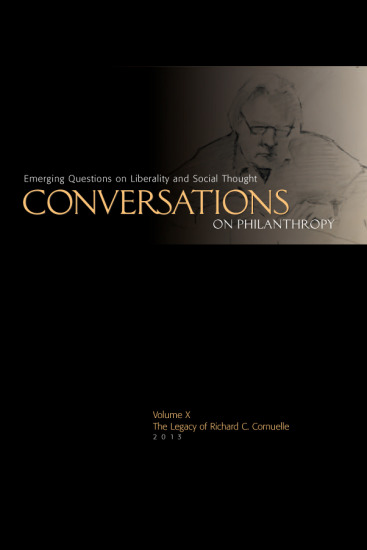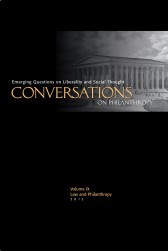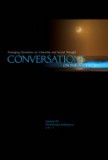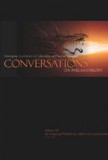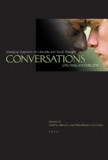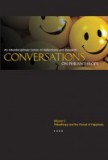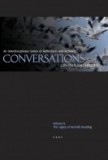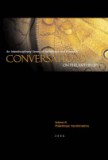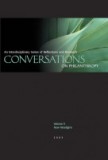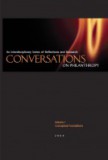Interested in learning more? Subscribe to our mailing list.
Conversations on Philanthropy is an annual publication of The Philanthropic Enterprise. Seeking to ignite reflection and discussion on the role of beneficence in the social order, Conversations features academic papers, essays, and reviews by scholars, philanthropists, and social entrepreneurs

Volume VI
Identity, Interests, and Philanthropic Commerce, 2009
Download the entire journal as a PDF ![]()
In the fall of 2008, The Project for New Philanthropy Studies hosted a colloquium intended to advance our understanding of philanthropy as a selforganizing system of human interaction and to explore the integral role of the philanthropic order in the extended network of social cooperation that Adam Smith called the “great society of mankind.” Robert Garnett, associate professor of economics at Texas Christian University, generously served as codirector of this program. Read More...
JACK BIRNER is a research professor for University College Maastricht and professor of economics and the philosophy of social science, department of sociology, University of Trento, Italy. He has an international business administration degree from Nijenrode, The Netherlands, a BA in economics and philosophy from Michigan State University, doctorates from Erasmus University Rotterdam, and a PhD from the University of Amsterdam. His current research interests include cultural evolution, the functioning of markets, the creation and destruction of value and complementarity in economic and social capital. An important source of inspiration: the history of economic thought. Also in preparation is a book on Hayek’s evolutionary research program. He is also a part-time wine maker.
LAURENT DOBUZINSKIS is Associate Professor of political science at Simon Fraser University (Canada). His current research is focused on the history of economic and political thought, with special emphasis on French political economy, and he is writing a book on the moral discourse of economists. He is the author or editor or several books and articles on topics ranging from public policy to political philosophy.
DAVID ELLERMAN works in the fields of economics and political economy, social theory and philosophy, and in mathematics. His undergraduate degree was in philosophy at M.I.T. ('65) and he has Masters degrees in Philosophy of Science ('67) and in Economics ('68), and a doctorate in Mathematics ('71) all from Boston University. He has been in and out of teaching in economics, mathematics, accounting, computer science, and operations research departments in various universities (1970-90), founded and managed a consulting firm in East Europe (1990-2), and worked in the World Bank from 1992-2003 where he was an economic advisor to the Chief Economist (Joseph Stiglitz and Nicholas Stern). Now he is a visiting scholar at the University of California in Riverside. He has published numerous articles in various fields (see Curriculum Vitae) and five books.
JACQUES T. GODBOUT is professor emeritus at the National Institute for Scientific Research (Université du Québec, Canada). During many years he has studied and published books and articles on participation and democracy, from the perspective of the relations between public and non-profit organizations and their clientele. These research projects have led him to be more and more interested in the gift relationship. He has published many books on that subject, including Ce qui circule entre nous (Paris, Seuil 2007) and, in collaboration with Alain Caillé, L’Esprit du don, translated in many languages (In English: The World of the Gift, McGill-Queens’s University Press, 1998, 2000 paperback). He is currently studying various aspects of the gift in modern societies, such as: gift exchange in the family, blood and organ donations, volunteers, philanthropy, gift and market, gift and the state.
STEVEN GROSBY is professor of religion at Clemson University. His recent books includeNationalism: A Very Short Introduction (Oxford, 2005) and, as editor, Edward Shils, A Fragment of a Sociological Autobiography (Transaction, 2006).
SHAUN HARGREAVES HEAP is a graduate of Oxford and UC Berkeley. He is Professor of Economics at the University of East Anglia and has held positions at Concordia University and the University of Sydney. His current research concerns the social influences on decision making and in particular involves an experimental investigation of how group membership affects people's willingness to trust each other. He has published research in this area recently in the Economic Journal and in the American Economic Review. His other area of current research is on the influence and measurement of diversity in the media.
CHRISTINE DUNN HENDERSON is a Senior Fellow at Liberty Fund, Inc., a private educational foundation located in Indianapolis. She completed her undergraduate work at Smith College (A.B. in government and French studies) and received a Ph.D. in political science from Boston College. Prior to joining Liberty Fund, she taught political science at Marshall University. She is the contributing editor of Seers and Judges: American Literature as Political Philosophy, and co-editor of Joseph Addison's "Cato" and Selected Essays. Her primary areas of research and publication include nineteenth-century liberalism, as well as politics and literature.
JONATHAN B. IMBER is Jean Glasscock Professor of Sociology at Wellesley College where he has taught the past thirty years and where he is presently Director of American Studies. He is author of Abortion and the Private Practice of Medicine (Yale University Press, 1986), and most recently of Trusting Doctors: The Decline of Moral Authority in American Medicine (Princeton University Press, 2008). He has edited or co-edited seven books, including The Feeling Intellect: Selected Writings of Philip Rieff (University of Chicago Press, 1990) and most recently,Markets, Morals and Religion (Transaction Publishers, 2008). He is Editor-in-Chief of Society.
PAUL LEWIS was educated at Peterhouse, Cambridge, and Christ Church, Oxford. He was a Newton Trust Lecturer in the Faculty of Economics and Politics, and the Faculty of Social and Political Sciences, Cambridge University, and a Fellow of Emmanuel and Selwyn Colleges, before becoming a Senior Lecturer in Economics at King’s College, University of London. His research interests include: the Austrian school of economics; applied microeconomics; and the history and methodology of economics. He is a Visiting Scholar at the Mercatus Center at George Mason University, USA, a retained supervisor in economics at Peterhouse, Cambridge, and a member of the Cambridge Social Ontology Group.
GORDON LLOYD earned his bachelor’s degree in economics and political science at McGill University. He completed all coursework toward a doctorate in economics from the University of Chicago before receiving his master’s and PhD degrees in government at Claremont Graduate School. The co-author of three books on the American founding and author of two forthcoming publications on political economy, he also has numerous articles and book reviews to his credit. His areas of research span the California constitution, common law, the New Deal, slavery and the Supreme Court, and the relationship between politics and economics.
ROGER A. LOHMANN is Professor of Social Work and Benedum Distinguished Scholar at West Virginia University. He was editor of Nonprofit Management and Leadership from 2000-2008. He is the author of numerous journal articles and author of three books: Breaking Even: Financial Management in Human Services and The Commons: New Perspectives on Nonprofit Organization, Voluntary Action and Philanthropy and Social Administration (co-authored with Nancy Lohmann). He is also co-editor (with Nancy Lohmann) of Rural Social Work Practice and a forthcoming volume on public deliberation and sustained dialogue (co-edited with Jon Van Til). He was a pioneer of online intellectual discussion lists, founding ARNOVA-L (in 1990) and more than 30 other lists. He is the founder and chair of the board of the Nova Institute at West Virginia University and is currently engaged in developing an online graduate certificate program in nonprofit management and third sector studies and an update on his previous theoretical work on the commons theory of associations.
JAMES R. OTTESON received his BA from the University of Notre Dame and his PhD from the University of Chicago. His books include Adam Smith's Marketplace of Life (Cambridge, 2002) and Actual Ethics (Cambridge, 2006), the latter of which won the 2007 Templeton Enterprise Award. He has taught formerly at Georgetown University and at the University of Alabama, and is currently professor of philosophy and economics at Yeshiva University and Charles G. Koch Senior Fellow at the Fund for American Studies in Washington, DC.
DAVID L. PRYCHITKO is a professor of economics at Northern Michigan University. He has published widely in economics, and is the co-author (with Paul Heyne and Peter Boettke) of The Economic Way of Thinking, an introductory textbook published by Prentice Hall.
KEVIN QUINN is Associate Professor of Economics at Bowling Green State University. His research interests are in economic philosophy, especially the nature of rationality, and in the history of economic thought.
PAUL G. SCHERVISH is Professor of Sociology and Director of the Center on Wealth and Philanthropy (CWP) at Boston College, and National Research Fellow at the Indiana University Center on Philanthropy, and to the John Templeton Foundation. He was appointed a Fulbright Scholar for the 2000-2001 academic year at University College Cork in the area of research on philanthropy. For the 1999-2000 academic year he was appointed Distinguished Visiting Professor at the Indiana University Center on Philanthropy. He has been selected five times to the NonProfit Times annual “Power and Influence Top 50,” a list which acknowledges the most effective leaders in the non-profit world. He received a bachelor's degree in classical and comparative literature from the University of Detroit, a Masters in sociology from Northwestern University, a Masters of Divinity Degree from the Jesuit School of Theology at Berkeley, and a PhD in Sociology from the University of Wisconsin, Madison. With Keith Whitaker he is the author of Wealth and the Will of God: Discerning the Use of Riches in the Service of Ultimate Purpose (Indiana University Press, January 2010).
—Steven Grosby
It is not as if profound complications in our understanding of human action have not been long recognized; we surely understand that human motivations are so complicated that our pursuits appear at times to be contradictory. Adam Smith in The Theory of Moral Sentiments drew attention to one such complication:
There is many an honest Englishman, who, in his private station, would be more seriously disturbed by the loss of a single guinea, than by the national loss of Minorca, who yet, had it been in his power to defend that fortress, would have sacrificed his life a thousand times rather than, through his fault, have let it fall into the hands of the enemy (1982 [1759], 192).
—Jonathon B. Imber
Steven Grosby has carefully argued for his idea about the significance of “disinterested interest” as one basis for understanding the motivation to be philanthropic. Motivation itself is one tough nut to crack, and it reminds me that the better part of all judgment that we have of others is by necessity—that is, through experience—rooted in our observations of their actions rather than the reasons they may give for them. Economic thinking, however much it is extended into other fields by the theory of rational choice, elides the difference between motivation and action, settling instead on judging results or outcomes as the principal measure of success. Such thinking has about it an air of triumphalism; after all, whatever counts as failure indicts motivation as a causal ingredient in a formula for action that would count generosity, for example, as “rational” only insofar as the provider does not give away so much that he or she becomes the one requiring provision. Read More...
—James R. Otteson
Professor Steven Grosby’s interesting essay does not raise a new problem, but it does suggest a new—and provocative—way to address it. The problem, at bottom, is how to explain philanthropic behavior within the theory that human beings are self-interested, rational, utility maximizers. Grosby rightly indicates that, whatever else is true, human beings surely are notonly rational utility maximizers. They frequently, indeed routinely, sacrifice their own interests to serve the interests of others, and they also frequently “achieve satisfaction from acting in accord with what [they perceive] to be the right thing to do” even “at considerable cost [to themselves] while the benefit of the action accrues to another” (2009, 3). An example Grosby raises to illustrate his point is patriotism, especially in its ultimate expression: “Whatever the satisfaction derived by the individual in sacrificing his or her life, the benefit or return of this action accrues not to that individual but to the nation.”(2) Read More...
—Gordon Lloyd
Scholars, particularly German ones, have written about an ages-old puzzle they call “Das Adam Smith Problem,” namely, how could the same person over several decades write The Wealth of Nations and The Theory of Moral Sentiments and revise them here and there, yet never reconcile “the contradiction”? Today, scholars no longer wrestle with how the same person could provide a strong case for self-interested action in one book and make an equally compelling case for other-regarding conduct in another book. Instead, we have a new Das Adam Smith Problem: how does the reconciliation take place? That debate continues, with obvious consequences for the future study of philanthropy. Read More...
—Paul G. Schervish
In “Philanthropy and Human Action,” Steven Grosby succeeds in his effort to explain the coexistence of “self-interest and self-sacrifice” within the theory of rational choice. My question is whether his case for “an interest in acting disinterestedly” (what I will call an interested disinterestedness), as an amendment to the theory of rational choice, contributes substantially enough to our understanding of what mobilizes our care for others. Grosby clearly recognizes the shortcomings of rational choice theory in explaining what many self-conscious, sensitive, and discerning individuals describe as sacrificial, generous, or philanthropic human behavior. In order to capture such beneficent orientations of individuals, Grosby tends to speak of these orientations as “disinterestedness” and of the individuals and behaviors reflecting such orientations as “disinterested.” These terms work just fine for his purposes, which are (1) to contrast disinterestedness with self-interest, (2) to reconcile rational choice with his belief that altruistic orientations truly exist, and (3) to do this without abandoning the initial principle of rational choice theory, namely that self-interest remains the ultimate impetus for all behavior. Read More...
—Paul Lewis
Philanthropy—“voluntary giving and association that serves to promote human flourishing” (Ealy 2005, 2)—is often said to have three key features. First, it is said to involve behavior that is in some sense “disinterested,” “benevolent,” or “altruistic.” For Steven Grosby, for instance, the existence of philanthropy reveals that there are “a number of diverse orientations of human action,” one of which takes the form of “disinterested or ‘selfless’ action, of works on behalf of others whom one knows or does not know which imposes costs on the individual but which confers benefits to others” (2009, 2, 4). Similarly, according to Jacques Godbout the gift is “a moral act and as such is ‘intrinsically motivated and not subject to means-ends analysis’ ” (1998, 91). Read More...
—Kevin Quinn
“[Dostoevsky’s] concern was always with what it is to be a human being—that is, how to be an actual person, someone whose life is informed by values and principles, instead of just an especially shrewd kind of self-preserving animal.”
—David Foster Wallace, Consider the Lobster
Paul Lewis has written a very interesting and wide-ranging paper. One of its concerns, and the one I will focus on here, is to enrich and flesh out Sen’s notion of commitment by using insights from recent philosophical work on collective intentionality and identity. The context, of course, is the application to philanthropic action, which Lewis sees, plausibly, as exemplary of Senian commitment. Read More...
—Shaun Hargreaves Heaps
People act philanthropically, Paul Lewis argues, because these actions serve to fix or express their identity. To make sense of this, he sketches a model of individual agency that has a two-tiered structure in which what is added to a conventional instrumental model of acting to achieve an end is, variously, a sense of commitment or an ability to switch into a mode of “we reasoning.” In both cases it is membership in a group that creates the possibility of this distinct second motivational tier. He also argues that Hayek’s defense of the classical liberal view of social/market order depends on such a model of agency (and the implicit possibility of philanthropic behaviors). Read More...
—David Ellerman
Can philanthropy share the success of the business sector as a spontaneous order? Instead of directly addressing this question, I will analyze some of the presuppositions. Firstly, I argue that two logics run through human affairs: the logic of exit and the logic of commitment and voice. Secondly, the economy or business sector is composed of markets, natural sites for the logic of exit, and organizations which are natural sites for the logic of commitment. Economics, neoclassical or Austrian, focuses on exit-based markets, the main examples of spontaneous orders, while I argue along with Herbert Simon that organizations have an equal if not more important role in modern economies. How might people address their community's social and environmental problems to the extent that government is ineffective? Read More...
—David L. Prychitko
David Ellerman offers a nice paper on organization theory, one that combines Hirschman’s two logics (exit and commitment) with Simon’s work on organizations. He suggests that the size of the philanthropic sector in the United States is positively related to the size of the absentee-owned, profit-maximizing corporation. This is a novel hypothesis.
I agree with the bulk of his lengthy discussion of Hirschman and Simon (and the contrast between the theory of American firms versus J-firms), and this accounts for almost the entire paper. Those of us acquainted with the literature will find little that is new here. This makes it something of a challenge for me to find something to criticize. Read More...
—Roger A. Lohmann
In his essay on “Rethinking Philanthropy and Business,” David Ellerman makes it clear that he has little interest in the existing phenomenon that Bremner (1988), Payton (1988), Ealy (2009), McCully (2007) and others characterize as philanthropy. Ellerman’s presentation of philanthropy in this piece is idiosyncratic, endorsing in turn both a residual, “government failure” approach and a market failure approach to which he adds his own “philanthropic failure” approach which, he says, could be corrected by corporate reform. The result is a view of philanthropy and nonprofit activity, which he says is much the same thing, as epiphenomena whose existences are conditional on the failures and inadequacies of corporate business in enabling individuals to address collective concerns through their work life. In this way, Ellerman seeks to move philanthropy entirely off the map of human affairs. In its place, he offers a fairly concise definition of what others today call social enterprise. His distinct contribution here may well be his effort to give voice to a firmly anti-philanthropic view within the literature of philanthropy itself. For those whose primary interest (and engagement with this journal) is mediated not through a primary interest in “business (in some sense)” but through an interest in understanding philanthropy, it appears that the Ellerman “rethinking” presaged in the title is largely a matter of simple and complete dismissal. That business may—or in some reconfigured form, would—offer a socially responsible venue for collective action is one of a number of unexplored presuppositions in the paper. Read More...
—Laurent Dobuzinskis
Individuals act more or less simultaneously as economic agents, citizens, and participants in civil society. Their interactions and their ways of fulfilling these roles take many forms. Not all of them can be said to be self-organizing, yet in several instances patterns of organization emerge spontaneously without being deliberately designed. Of course, the market economy—or “catallaxy,” as F. A. Hayek called it—remains the best example of such “spontaneous orders.” But there are others. Gus diZerega (2000), for example, has identified science and democracy as being similarly constituted by self-referential, self-organizing (some authors prefer the termautopoietic) processes. In this paper I focus on what I call the philanthropic order. By this I intend to refer not only to the activities of philanthropic foundations and of individual donors but also more broadly to a whole range of processes that allocate material and symbolic resources through nonmarket mechanisms fuelled by more or less explicitly altruistic motivations. Various phrases or terms have been used to describe part of this, or something similar to what I have in mind: the voluntary or nonprofit sector, “social capital,” and civil society more generally. Read More...
—Christine Dunn Henderson
Through a discussion of French thinkers Marcel Mauss and Serge-Christophe Kolm, Laurent Dobuzinskis’ thoughtful paper investigates what he calls the “philanthropic order,” a self-organizing order which originates in individuals’ gift-giving initiatives and creates complex webs of interdependence, obligation, and connectedness among people. Perhaps more familiarly known as the nonprofit sector or civil society, the spontaneously arising philanthropic order exists, as Dobuzinskis notes, “more or less precariously between the commercial sphere and the state” (2009, 116). Dobuzinskis defines the philanthropic order broadly, including not merely the activities of donors and foundations but also “a whole range of processes that allocate material and symbolic resources through nonmarket mechanisms fuelled by more or less explicitly altruistic motivations” (115). Although aware of possible tensions and conflict, Dobuzinskis nevertheless seems to understand the philanthropic order as an essential complement to the market order, insofar as it produces and reinforces the social capital upon which the market depends, by enabling individuals to interact with other individuals (friends, neighbors, and even strangers) in a manner independent of yet broadly beneficial to the economic order and perhaps to the political one as well. Read More...
—Jack Birner
The writers of many economics textbooks state the discipline’s subject matter as the study of what is produced for whom, and how. Curiously enough, they rarely complete the usual list of “wh-” questions to include when and why. This is symptomatic of the neglect by mainstream economics of time and people’s motivations. The neglect of time—and of demography, which until about 1911 was an integral part of every course in economics—has left economists, governments, and private citizens insufficiently prepared for dealing with the consequences of the aging of industrial societies. Ought the government to provide for our needs after we have stopped working for our income? In that case we have to decide how to redistribute the earnings and wealth that have been generated by the market, through taxation and transfer payments by the government. Or should the provision for old age be left up to private initiative? The latter is usually interpreted as meaning that every individual takes care of their own pension. But the sphere of private initiative does not stop here. Individuals may also decide to voluntarily transfer their wealth to others without expecting anything in exchange. This is the sphere of altruism and philanthropy, which also suffers from a lack of attention by economists. Read More...
—Jacques T. Godbout
I first wish to thank Lenore Ealy for the opportunity to comment briefly on Laurent Dobuzinskis’ stimulating paper. The author shows that most analysts, including Hayek, consider Mauss’s analysis, and the gift phenomenon in general, to apply primarily to archaic societies. “Gifts exist only at the margin of the market economy” (Dobuzinskis 2009, 119).
Furthermore, when it does apply to present-day societies, it is defined as disinterested, nonreciprocal, acts.
What the Maussian movement (MAUSS, an acronym for Mouvement anti-utilitariste dans les sciences sociales)1 first attempted to show is that Mauss’s vision of the gift very much applies to modern society. This is the main thesis in our book, The World of the Gift, first published in French in 1992. The gift here is an order that is both spontaneous and modern. (I prefer “gift” to “philanthropic” order. Philanthropy is simply one type within the “gift order.”) The market order itself rests in part on this order, if only because the gift feeds trust, a necessary ingredient of the Hayekian catallaxy (Dobuzinskis 2009, 122). This is why we don’t think of the gift as first and foremost an economic order, although its economic dimension is important and increasingly so in an information economy with phenomena such as open source and “copyleft” (124). The gift is not only a gift economy (130), and the gift and economic orders are not always, and not necessarily, antagonistic. Let me try to briefly develop these points. Read More...
Book Reviews: 
Reviewed by G. M. Curtis, III
This is a short book, “a quick look” as Friedman explains (178), about a very big story. It is an ambling commentary, appearing to have been cobbled from class notes for his course on trusts and estates, covering many topics lightly, cherry-picking a wide variety of state and federal judicial decisions, some with an eye for illustrating a legal doctrine or rule; some for the drama; and some for the author’s political purpose. Readers of such a volume as this should not expect that it offers a thoughtful summary of a deeper scholarship preceding it. Friedman’s hallmark is the advocacy of the instrumental view of the law, hence his emphasis on an isolated present. This man-centered view, often associated with Oliver Wendell Holmes, Jr., posits that the law follows social function and interest; so the viewpoint tends to yield commentaries which take little or no significant notice of higher law, constitutional or natural. Read More...
Reviewed by Nicholas Capaldi
The main thrust of this lengthy series of short essays is (a) to provide some “empirical comparisons” between “philanthropy and indicators of economic and social change” (xii) as well as (b) to raise questions about “institutional accountability” (xii). In addition to sections on the economy, ethics and accountability, and management dilemmas, there are sections on specific issues such as healthcare, education, the international context, and corporate philanthropy. Read More...
Reviewed by Heather Wood Ion
Some books enlighten us, some books inspire us, and some books challenge us to expand our understanding of who we are and who we can become. Richard Gunderman’s We Make a Life by What We Give does all three.
Dr. Gunderman addresses the issues of philanthropy and the roles of generosity in our lives with stunning clarity, and with a broad courage asks the wicked and necessary questions that many authors avoid. He begins by distinguishing between our various models of philanthropy: the charity model which often creates both dependency and resentment; the model of scientific giving which deepens the distinctions between givers and recipients; and the liberal model which enhances the flourishing of the giver as well as the recipient. Read More...
Reviewed by Frederick Turner
Back in Shakespeare’s day a remarkable group of people came together, more or less in secret, calling themselves “The School of Night.” They ended up being responsible for starting a large percentage of the ideas and projects that made England great in the next four centuries. One of their number was the great mathematician/scientist Thomas Hariot, who created several of our algebraic signs, the fundamentals of modern atomic theory, some elements of calculus, the telescope (before Galileo), the first dictionary of the Algonquin language, and (with Ferdinand Vieta) the modern usage of the zero. Read More...
Reviewed by Richard B. Gunderman
The time is ripe for a reconsideration of philanthropy. Tough economic times have driven some philanthropic organizations out of business, and forced others to carefully reexamine their mission and strategy. New technologies are changing the face of the field, particularly for smaller organizations whose size once constrained their ability to connect with important constituencies. State and federal governments are closely scrutinizing the activities of philanthropic organizations to ensure that they fulfill their responsibilities as bearers of the public trust (and in many cases, beneficiaries of tax-exempt status). Even the very meaning of the word philanthropy has been a subject of increasing contention. Read More...
Reviewed by Martin Morse Wooster
Any donor setting up a foundation must ask himself or herself several questions. What do I want to do with my money? What are my goals? How long do I want to stay in business?
There are, of course, all sorts of books, manuals, and philanthropic advisors ready to offer their services to the donor who wants to learn more about how to be a good philanthropist. What makes Money Well Spent distinctive is that Brest, president of the Hewlett Foundation, and Harvey, president of the ClimateWorks Foundation, aren’t trying to offer moral or spiritual advice, or a guide to how to comply with IRS regulations. Rather, their purpose is to encourage donors to think carefully about why they’re giving and to nudge donors and program officers to do a better job with their grantmaking. The result is a book that is a sort of management guide for foundation executives. Money Well Spent is, for the most part, a book that any donor would find useful and interesting. Read More...
Reviewed by Laurie Morrow
Tom, a small businessman whose nonprofit was in startup, wanted to hire me to handle his organization’s fundraising. His nonprofit focused on an area in which I had expertise, his offer was generous, and I needed the work—so Tom was surprised when I turned him down flat.
“I can’t work for a percentage of what I raise,” I explained. “Although that’s a common practice in the for-profit world, in the nonprofit world it’s considered unethical.” Read More...
Reviewed by Heather Wood Ion
When Begging for Change was first published, I hoped it would create a revolution of perspective in board members as well as service providers in nonprofit organizations. I distributed copy after copy with evangelical zeal, and insisted that everyone pay attention to “Robert’s Rules for Nonprofits.” When David Ellerman’s book Helping People Help Themselves(Ann Arbor: University of Michigan, 2005) was published the following year, I thought that at last the independent sector had two wise and courageous mentors for the critical reinvention of its role. Read More...

